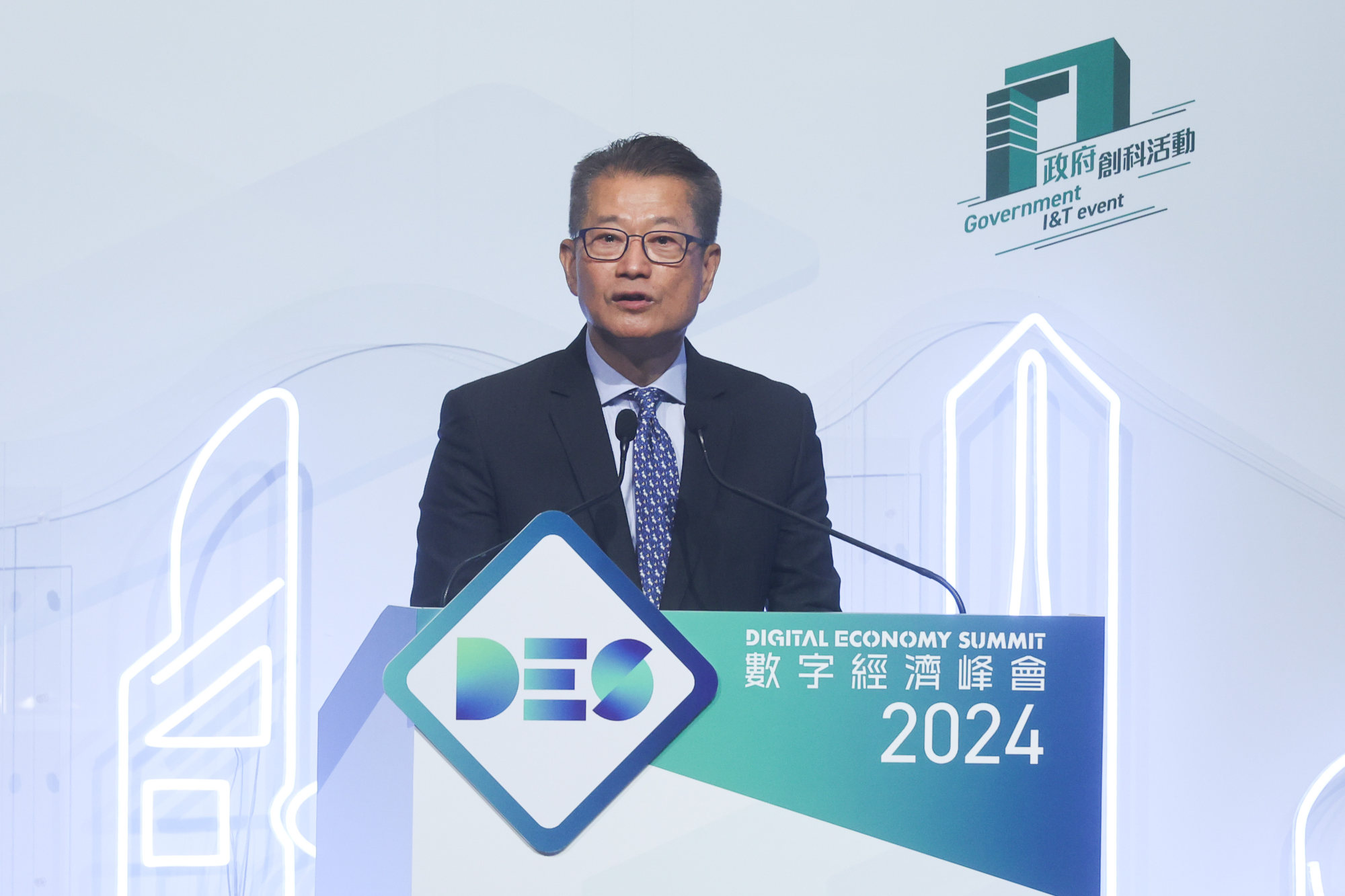
Hong Kong to set up new policy office to help drive development of digital economy, finance chief Paul Chan says
- Financial Secretary Paul Chan says setting up office among 12 recommendations from a government committee to help guide Hong Kong through new digital era
- He also points to importance of supporting data flows during two-day summit bringing together business leaders to discuss digital economy
Hong Kong will set up an office this year to promote the development of the digital economy and a smart city on the back of an estimated 50 trillion yuan (US$6.91 trillion) market across the border, the financial chief has said.
The proposals from the Digital Economy Development Committee, which is headed by Chan, included a greater focus on the promotion of city and cross-boundary information flows, the development of digital infrastructure, digital transformation and talent development over the next five years.
“In the domain of the digital economy, the landscape is complex and rapidly evolving. Competition among cities and economies in this field is keen,” the finance chief said. “Hong Kong must move fast to stay ahead of the curve.”
Chan added the new office would be in charge of mapping out and implementing digital policies, with a mandate to spearhead the development of the digital economy and smart city.
The two-day summit aims to bring together business leaders to discuss the future of fields such as smart city development, fintech, Web3, artificial intelligence (AI) and new industrialisation.
Chan also discussed plans to encourage public and private sector organisations to share information.
As part of the effort, the Hong Kong Monetary Authority-run Commercial Data Interchange would extend its coverage so more businesses could easily obtain loans by consenting to share data with partnering banks, he said.
The initiative helped to facilitate more than 13,000 loan applications worth a total of about HK$12 billion (US$1.5 billion) by the end of last year, Chan added.
He also highlighted Hong Kong’s unique advantages in the data trading sector, given that the “one country, two systems” government principle gave it “unfettered access to international data” as the city made progress in developing a cross-boundary information flow with mainland China.

The bay area is Beijing’s plan to integrate Hong Kong, Macau and nine mainland cities into an economic powerhouse.
Hong Kong authorities in December launched a pilot scheme to ease the flow of personal information across the bay area’s banking, credit referencing and healthcare sectors.
Chan said on Friday that such measures would be extended to other sectors once officials had reviewed the results from the pilot scheme.
“These and other coming endeavours will drive more public and private cross-boundary services, and benefit our businesses and citizens,” Chan added. “They will also encourage more research and development activities in AI and life and health technologies, here in Hong Kong.
“Looking ahead, we see clear potential for international data trading to become a new and thriving industry in the city.”
Hong Kong health authorities, Science Park offer patient data to biotech firms
The pilot scheme was also designed to break down information barriers and reduce the cost of compliance measures for businesses in the bay area.
Hong Kong’s Innovation, Technology and Industry Bureau said the initiative allowed individuals and organisations to share and access data after they signed a standard contract that outlined the parties’ responsibilities and obligations to protect personal information.
But the bureau added the scheme does not affect the supervisory and regulatory roles of Hong Kong’s Office of the Privacy Commissioner for Personal Data in ensuring compliance with the city’s privacy laws.
The finance chief added that the city government had commissioned experts to study how Hong Kong could successfully develop a strong data-trading system.
Chan’s speech on Friday also touched on China’s role in the digital economy field, and said the country was an industry leader.
The scale of the mainland’s digital economies last year was estimated to be more than 50 trillion yuan, accounting for over 40 per cent of the jurisdiction’s gross domestic product.
Hong Kong finance sector on pace in AI deployment, but concerns persist: survey
“The digital economy has clearly emerged as a new driving force for global economic development,” Chan said.
“From digital payments to generative AI, data is rapidly changing how businesses operate and thrive, how cities are managed, and, ultimately, how we work, learn and live.”
Wang Song, the vice-minister of the Cyberspace Administration of China, also spoke at the summit and underlined the importance of making the most out of data as a key step on the way to development of a digital economy.
He said that Hong Kong’s policy statement covering data flow and information security and the mainland’s own regulations had created an important institutional foundation for collaboration between the two.
“The Cyberspace Administration of China is looking to work with the [Hong Kong] government to promote more practical cooperation projects to make digitisation part of the industrial supply chain and promote the interconnection of digital economy infrastructures,” he said.
Chan, in reply to separate questions from lawmakers, said the scope of pilot testing of e-CNY, China’s sovereign digital currency, would be further expanded in Hong Kong after a smooth trial at four e-CNY operating institutions and 18 banks in the city.
More residents could set up e-CNY wallets linked to the city’s Faster Payment System by then, which could “further enhance the efficiency and user experience of cross-boundary payment services”, he said.
This would bring new impetus to cross-boundary fintech cooperation, Chan added.
But he said economic benefits from the measure were difficult to quantify and he did not give an estimate.

